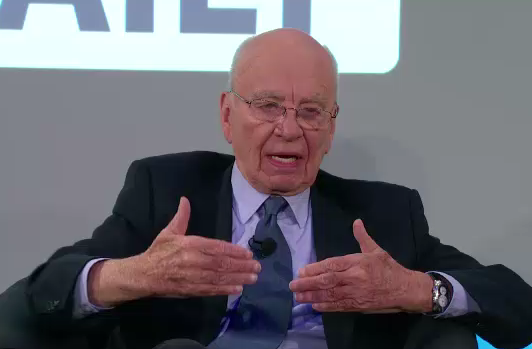Wolff: Murdoch Thinks 'All Day' About Buying NY Times. May Get It.

The fate of the New York Times will play out "in a matter of months" – and, in the end, there is a "fair likelihood," that it will wind up in the hands of Rupert Murdoch, the media commentator, Michael Wolff, said Tuesday morning at the Harvard Business School Club of New York.
Murdoch, the subject of a biography written by Wolff and released in December, "sits around all day," Wolff said, and "thinks about buying the New York Times."
Murdoch's interest in the Times was first asserted in September by Wolff as he prepared his book for publication.
But since then, financial pressures at the Times have become increasingly apparent. The company tried to raise $225 million by mortgaging off its almost-spanking-new headquarters building in NYC. But it couldn't, because it (the paper itself) was not deemed a credit-worthy tenant, Wolff said.
Then it tried to sell off its stake in the Boston Red Sox. But investors who only own a minority piece of a sports team can "only get good seats" at the stadium, in exchange for their shares, he said.
Most recently, the paper's owning family, the Sulzbergers, appear to have turned to one of the world’s richest men, Carlos Slim Helu, to inject hundreds of millions of dollars.
But here's where Wolff suggested the fabled news gathering operation based in the heart of New York that it lent its name, Times Square, might well be better off with Murdoch holding the reins.
Murdoch, who already owns the New York Post and took over the Wall Street Journal in December 2007 from the Bancroft family, is the only bright spot in newspapering as digital media suck away revenue from metropolitan dailies, magazines and printed publications everywhere. Pictures of scantily clad women and blaring headlines in papers he owns like the Post may have earned Murdoch the reputation of being a "down-market publisher."
But that, he said, is "not true." Instead, Murdoch prizes the best paper in a market. In the case of the Wall Street Journal, where his $60 a share offer faced significant internal resistance even though it was far above what he could have paid in a worsening news market, Murdoch has turned it into a "vibrant, new-feeling newspaper." Instead of the "self-consciously frumpy paper" it was.
Why is Slim not the right savior? Wolff's take came from an unidentified member of the Mexican media, whom the Vanity Fair contributor asked what he thought of his country’s richest man.
"He's our national embarrassment. He's a crook," Wolff said he was told.
Slim came to his riches by leading an investor group that included France Telecom and Southwestern Bell Corporation (now AT&T) that acquired the Mexican national telephone monopoly in 1990. Controversy surrounded the sale of the formerly state-owned firm, because the payout came from money earned by the phone company over several years.
"Compared to Carlos Slim, Rupert Murdoch turns out to be a Barack Obama," Wolff said.
With home delivery being cut down in Detroit, papers about to fold in Denver and Seattle, and layoffs being instituted at almost all other papers nationwide, there is “no good news in the newspaper business, except Rupert Murdoch," Wolff said. In the end, “forget everything else, he's a newspaperman."
The fate of the Times could be determined by May. The New York Times Company must pay lenders about $400 million then.
Whether Murdoch would have to divest the Post, in particular, the Journal – which he has made more like the Times, adding political and international coverage -- or any other holding of his News Corporation if he were to buy the New York Times remains to be seen.
